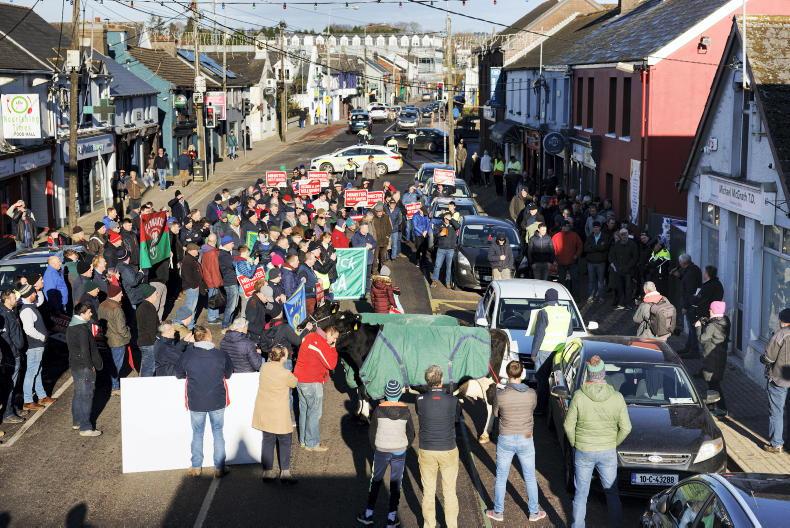Minister for Enterprise, Trade and Employment Simon Coveney has called for major effort to avoid a situation where farmers affected by the nitrates derogation cut decide to cull animals “in a way that’s not necessary".
Speaking at the Sustainable Dairy Future conference in UCC on Monday, Minister Coveney said he was “frustrated” by the nitrates derogation cut, as were farmers who had asked for more time to change.
Referring to the culling of pregnant cows, which some farmers say they will be forced to do, the former agriculture minister said: “Between now and the first of January and into next year, there needs to be a significant collective effort to help the farmers that are impacted by this change to cope with that, in a way that doesn't result in sort of dramatic decisions to cull animals in a way that's not necessary.”
In recent days, around 200 farmers and Irish Farmers' Association (IFA) members protested outside the constituency offices of Minister Coveney, Minister for Finance Micheal McGrath and An Tánaiste Michaél Martin to highlight their position.

An IFA protest of over 200 farmers in Carrigaline outside the constituency office of Simon Coveney. \ Donal O' Leary
Minister Coveney said much more clarity was needed on the capacity of livestock farmers to export slurry to arable farms, adding that he had been contacted in recent days by tillage farmers about taking large quantities of slurry.
Minister Coveney highlighted the impact any further reduction to the derogation would have, saying: “Whatever about moving from 250 [N/ha], to 220, moving to 170 would have an extraordinary impact, in a negative way, in the dairy industry and on family farm incomes.”
However, he said the European Commission’s view was “pretty straightforward – stabilise or improve water quality, and you'll hold on to your derogation”.
The minister said the dairy industry is evolving, changing and modernising, and insisted that it could not sit “still and resist that change”.
“But we can certainly manage it. As, indeed, the agricultural sector has in the past for many of the previous challenges that we faced and we've done it really successfully. I think we can do this too.
“But it needs leadership from many of the people in this room to be able to bring farmers with us and their families to make sure that we maintain incomes and maintain a viable dairy industry into the future, but also hit the targets that will ensure that we remain competitive.”
Read more
Dairy farmers protest in Cork over derogation
Milk processor CEOs accused of being absent in derogation debate
Minister for Enterprise, Trade and Employment Simon Coveney has called for major effort to avoid a situation where farmers affected by the nitrates derogation cut decide to cull animals “in a way that’s not necessary".
Speaking at the Sustainable Dairy Future conference in UCC on Monday, Minister Coveney said he was “frustrated” by the nitrates derogation cut, as were farmers who had asked for more time to change.
Referring to the culling of pregnant cows, which some farmers say they will be forced to do, the former agriculture minister said: “Between now and the first of January and into next year, there needs to be a significant collective effort to help the farmers that are impacted by this change to cope with that, in a way that doesn't result in sort of dramatic decisions to cull animals in a way that's not necessary.”
In recent days, around 200 farmers and Irish Farmers' Association (IFA) members protested outside the constituency offices of Minister Coveney, Minister for Finance Micheal McGrath and An Tánaiste Michaél Martin to highlight their position.

An IFA protest of over 200 farmers in Carrigaline outside the constituency office of Simon Coveney. \ Donal O' Leary
Minister Coveney said much more clarity was needed on the capacity of livestock farmers to export slurry to arable farms, adding that he had been contacted in recent days by tillage farmers about taking large quantities of slurry.
Minister Coveney highlighted the impact any further reduction to the derogation would have, saying: “Whatever about moving from 250 [N/ha], to 220, moving to 170 would have an extraordinary impact, in a negative way, in the dairy industry and on family farm incomes.”
However, he said the European Commission’s view was “pretty straightforward – stabilise or improve water quality, and you'll hold on to your derogation”.
The minister said the dairy industry is evolving, changing and modernising, and insisted that it could not sit “still and resist that change”.
“But we can certainly manage it. As, indeed, the agricultural sector has in the past for many of the previous challenges that we faced and we've done it really successfully. I think we can do this too.
“But it needs leadership from many of the people in this room to be able to bring farmers with us and their families to make sure that we maintain incomes and maintain a viable dairy industry into the future, but also hit the targets that will ensure that we remain competitive.”
Read more
Dairy farmers protest in Cork over derogation
Milk processor CEOs accused of being absent in derogation debate







 This is a subscriber-only article
This is a subscriber-only article










SHARING OPTIONS: